List of states with limited recognition
In international law a political entity needs to fulfill different criteria to become an independent state: One of these criteria is that other states must recognize it as a state. If more states recognize it, becoming a de jure sovereign state will be easier.
Many of the territories listed below broke off (separated themselves) from their original parent state, and so they are often referred to as "break-away" states, that are de facto independent and are not recognized by other states or are only recognized by few states. They may have some military protection and informal diplomatic representation abroad. Another state may help them avoid forced reincorporation into its original state.
UN member states not recognized by at least 1 UN member state
 The Republic of Armenia was independent since 1991 after the Dissolution of the Soviet Union. The Republic of Armenia is not recognized by one UN member state, Pakistan, which has a position of supporting Azerbaijan since the First Nagorno-Karabakh War.
The Republic of Armenia was independent since 1991 after the Dissolution of the Soviet Union. The Republic of Armenia is not recognized by one UN member state, Pakistan, which has a position of supporting Azerbaijan since the First Nagorno-Karabakh War.
 The Republic of Cyprus is not recognized by one UN member state, Turkey and one non-UN member state, Northern Cyprus, due to the ongoing civil dispute over the island. Northern Cyprus claims the northeastern half of the island.
The Republic of Cyprus is not recognized by one UN member state, Turkey and one non-UN member state, Northern Cyprus, due to the ongoing civil dispute over the island. Northern Cyprus claims the northeastern half of the island.
 The People's Republic of China is the more widely recognized of the two claimant governments of China, the other being the Republic of China (ROC, also known as Taiwan). The United Nations recognized the ROC as the sole representative of China until 1971 when it decided to give this recognition to the PRC instead (see United Nations General Assembly Resolution 2758). The PRC and the ROC do not recognize each other's statehood, and each enforces its own version of the One-China policy so that no state can recognize both of them at the same time. The states that recognize the ROC (14 UN members and the Holy See as of 20 September 2019) regard it as the sole legitimate government of China and therefore do not recognize the PRC. Bhutan is the only UN member state that has never explicitly recognized either the PRC or the ROC. The Republic of China considers itself to be the sole legitimate government of China (including Taiwan), and therefore claims exclusive sovereignty over all territory controlled by the PRC.
The People's Republic of China is the more widely recognized of the two claimant governments of China, the other being the Republic of China (ROC, also known as Taiwan). The United Nations recognized the ROC as the sole representative of China until 1971 when it decided to give this recognition to the PRC instead (see United Nations General Assembly Resolution 2758). The PRC and the ROC do not recognize each other's statehood, and each enforces its own version of the One-China policy so that no state can recognize both of them at the same time. The states that recognize the ROC (14 UN members and the Holy See as of 20 September 2019) regard it as the sole legitimate government of China and therefore do not recognize the PRC. Bhutan is the only UN member state that has never explicitly recognized either the PRC or the ROC. The Republic of China considers itself to be the sole legitimate government of China (including Taiwan), and therefore claims exclusive sovereignty over all territory controlled by the PRC.
 The State of Israel is not recognized by 28 UN members. The Palestinian Liberation Organization (PLO) which enjoys majority international recognition as the sole representative of the Palestinian people, recognized Israel in 1993. In January 2018, the Palestinian Central Council voted to suspend recognition of Israel, but the decision has yet to be acted upon. The State of Palestine considers itself to be the legitimate government of the West Bank, much of which is under occupation. The Syrian Arab Republic considers itself to be the legitimate government of the Golan Heights, a territory which Israel claims with limited recognition.
The State of Israel is not recognized by 28 UN members. The Palestinian Liberation Organization (PLO) which enjoys majority international recognition as the sole representative of the Palestinian people, recognized Israel in 1993. In January 2018, the Palestinian Central Council voted to suspend recognition of Israel, but the decision has yet to be acted upon. The State of Palestine considers itself to be the legitimate government of the West Bank, much of which is under occupation. The Syrian Arab Republic considers itself to be the legitimate government of the Golan Heights, a territory which Israel claims with limited recognition.
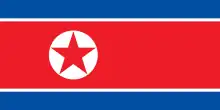 The Democratic People's Republic of Korea is not recognized by three UN members: France, Japan and South Korea; and one non-UN member, Taiwan. South Korea considers itself to be the sole legitimate government of Korea, and claims all territory controlled by North Korea.
The Democratic People's Republic of Korea is not recognized by three UN members: France, Japan and South Korea; and one non-UN member, Taiwan. South Korea considers itself to be the sole legitimate government of Korea, and claims all territory controlled by North Korea.
 The Republic of Korea is not recognized by one UN member, North Korea. North Korea considers itself to be the sole legitimate government of Korea and claims all territory controlled by South Korea
The Republic of Korea is not recognized by one UN member, North Korea. North Korea considers itself to be the sole legitimate government of Korea and claims all territory controlled by South Korea
UN observer states not recognized by at least one UN member
 The State of Palestine is a de jure sovereign state in Western Asia officially governed by the Palestine Liberation Organization and claiming the West Bank and Gaza Strip with Jerusalem as the designated capital; in practice, however, only partial administrative control is held over the 167 "islands" in the West Bank, and Gaza is ruled by a rival government (Hamas). Israel regards the area claimed by Palestine as 'disputed' territory (that is, territory not legally belonging to any state). Israel gained control of the Palestinian territories as a result of the Six-Day War in 1967 but has never formally annexed them. The State of Palestine (commonly known as Palestine) was declared in 1988 by the Palestine Liberation Organization, which is recognized by a majority of UN member states and the UN itself as the sole representative of the Palestinian people. Since the end of the first Palestinian Intifada against Israel, the Israeli government has gradually moved its armed forces and settlers out of certain parts of Palestine's claimed territory, while still maintaining varying degrees of control over most of it. The Palestinian National Authority, which performs limited internal government functions over parts of Palestine, was established in 1994. In 2007, the split between the Fatah and Hamas political parties resulted in competing governments with Fatah exercising authority exclusively over the West Bank and enjoying majority recognition from UN member states, and a separate Hamas leadership exercising authority exclusively over the Gaza area (except for a short period from 2014 to 2016). Palestine is currently officially recognized as a state by 138 UN member states, the Holy See, and the Sahrawi Arab Democratic Republic. The remaining UN member states, including Israel, do not recognize the State of Palestine. The United Nations designates the claimed Palestinian territories as 'occupied' by Israel and accorded Palestine non-member observer state status in 2012. Palestine also has membership in the Arab League, the Organisation of Islamic Cooperation, and UNESCO.
The State of Palestine is a de jure sovereign state in Western Asia officially governed by the Palestine Liberation Organization and claiming the West Bank and Gaza Strip with Jerusalem as the designated capital; in practice, however, only partial administrative control is held over the 167 "islands" in the West Bank, and Gaza is ruled by a rival government (Hamas). Israel regards the area claimed by Palestine as 'disputed' territory (that is, territory not legally belonging to any state). Israel gained control of the Palestinian territories as a result of the Six-Day War in 1967 but has never formally annexed them. The State of Palestine (commonly known as Palestine) was declared in 1988 by the Palestine Liberation Organization, which is recognized by a majority of UN member states and the UN itself as the sole representative of the Palestinian people. Since the end of the first Palestinian Intifada against Israel, the Israeli government has gradually moved its armed forces and settlers out of certain parts of Palestine's claimed territory, while still maintaining varying degrees of control over most of it. The Palestinian National Authority, which performs limited internal government functions over parts of Palestine, was established in 1994. In 2007, the split between the Fatah and Hamas political parties resulted in competing governments with Fatah exercising authority exclusively over the West Bank and enjoying majority recognition from UN member states, and a separate Hamas leadership exercising authority exclusively over the Gaza area (except for a short period from 2014 to 2016). Palestine is currently officially recognized as a state by 138 UN member states, the Holy See, and the Sahrawi Arab Democratic Republic. The remaining UN member states, including Israel, do not recognize the State of Palestine. The United Nations designates the claimed Palestinian territories as 'occupied' by Israel and accorded Palestine non-member observer state status in 2012. Palestine also has membership in the Arab League, the Organisation of Islamic Cooperation, and UNESCO.
Partially recognized states with de facto control over their territory
 Abkhazia in Georgia is a self-declared and mostly functioning independent state. It is recognized by the Russian Federation, Nicaragua and Venezuela. The country is between the Caucasus and the Black Sea. It is recognized by the Georgian government as a part of northwestern Georgia. During the Soviet period, Abkhazia became a part of Georgia in 1931. It was an autonomous republic within Soviet Georgia. The Abkhazian Soviets said it was independent from Georgia in 1992. A short war was fought from 1992 through 1994. In June 1994, a ceasefire ended the fighting and left Abkhazia outside the control of Georgia's central government.
Abkhazia in Georgia is a self-declared and mostly functioning independent state. It is recognized by the Russian Federation, Nicaragua and Venezuela. The country is between the Caucasus and the Black Sea. It is recognized by the Georgian government as a part of northwestern Georgia. During the Soviet period, Abkhazia became a part of Georgia in 1931. It was an autonomous republic within Soviet Georgia. The Abkhazian Soviets said it was independent from Georgia in 1992. A short war was fought from 1992 through 1994. In June 1994, a ceasefire ended the fighting and left Abkhazia outside the control of Georgia's central government.
United Nations member states that are not recognized by all the other UN members are not listed here. (For example, 39 countries do not recognize Israel.)
 The Republic of China controls only Taiwan and some of the islands of the Republic of China since losing the Chinese Civil War in 1949. It lost most of its diplomatic recognition and UN seat to the People's Republic of China in October 25, 1971 by UN General Assembly Resolution 2758. It is now officially recognized by only 23 states. It has de facto (all but in name) relations with most countries through institutions such as the Taipei Economic and Cultural Representative Offices. (See political status of Taiwan).
The Republic of China controls only Taiwan and some of the islands of the Republic of China since losing the Chinese Civil War in 1949. It lost most of its diplomatic recognition and UN seat to the People's Republic of China in October 25, 1971 by UN General Assembly Resolution 2758. It is now officially recognized by only 23 states. It has de facto (all but in name) relations with most countries through institutions such as the Taipei Economic and Cultural Representative Offices. (See political status of Taiwan).
 The Turkish Republic of Northern Cyprus was set up in northern Cyprus in 1975, following the intervention of the Turkish Army in 1974, in response to a coup d'état by the Greek junta aiming at "enosis". It declared independence in 1983 and it is recognised only by Turkey. A United Nations proposal to unify the two Cypriot states was accepted by the Republic, but rejected in a referendum by the Greek Cypriot community, citing security concerns. Further attempts at reunification have been unsuccessful.
The Turkish Republic of Northern Cyprus was set up in northern Cyprus in 1975, following the intervention of the Turkish Army in 1974, in response to a coup d'état by the Greek junta aiming at "enosis". It declared independence in 1983 and it is recognised only by Turkey. A United Nations proposal to unify the two Cypriot states was accepted by the Republic, but rejected in a referendum by the Greek Cypriot community, citing security concerns. Further attempts at reunification have been unsuccessful.
 South Ossetia in Georgia is a self-declared and more or less functioning independent state with no international recognition from any other nation. After occupation of independent Georgia by Bolshevist Russia in 1921 it became the South Ossetian Autonomous Oblast within Soviet Georgia. It proclaimed independence from Georgia in 1991, and a ceasefire was declared in 1992.
South Ossetia in Georgia is a self-declared and more or less functioning independent state with no international recognition from any other nation. After occupation of independent Georgia by Bolshevist Russia in 1921 it became the South Ossetian Autonomous Oblast within Soviet Georgia. It proclaimed independence from Georgia in 1991, and a ceasefire was declared in 1992.
More unrecognized states with de facto control over their territory
 Somaliland (since 1991) is located in north west of Somalia. In May of 1991, north western clans declared an independent Republic of Somaliland that now includes five of the eighteen administrative regions of Somalia, corresponding to the British Somali Coast Protectorate which is located between Ethiopia, Djibouti, Puntland and the Gulf of Aden. Three regions of north Somalia claimed by Somaliland, Sool, Sanaag and Cayn are disputed with neighbouring Puntland in the north east.
Somaliland (since 1991) is located in north west of Somalia. In May of 1991, north western clans declared an independent Republic of Somaliland that now includes five of the eighteen administrative regions of Somalia, corresponding to the British Somali Coast Protectorate which is located between Ethiopia, Djibouti, Puntland and the Gulf of Aden. Three regions of north Somalia claimed by Somaliland, Sool, Sanaag and Cayn are disputed with neighbouring Puntland in the north east.
.svg.png.webp) Transnistria (Pridnestrovie), also spelled Transdniestria, is the part of Moldova east of the river Dniester and (since 1990) a self-declared and more or less functioning independent state with no international recognition from any sovereign state. It has a majority Slavic population, as opposed to majority Moldovan which Moldova has. Also known as the Dniester Republic, it has its own police, army, and currency and functions outside of the jurisdiction of Moldova, however, there is no sign of it becoming an internationally recognized country.
Transnistria (Pridnestrovie), also spelled Transdniestria, is the part of Moldova east of the river Dniester and (since 1990) a self-declared and more or less functioning independent state with no international recognition from any sovereign state. It has a majority Slavic population, as opposed to majority Moldovan which Moldova has. Also known as the Dniester Republic, it has its own police, army, and currency and functions outside of the jurisdiction of Moldova, however, there is no sign of it becoming an internationally recognized country.
Partially recognized states largely under military occupation
 Western Sahara is a territory claimed and largely administered by Morocco since Spain abandoned the territory in 1976. The Sahrawi Arab Democratic Republic controls the remainder of Western Sahara; it was proclaimed by the Front Polisario in 1976, is recognized by 46 UN member states, and a full member of the African Union. Sovereignty is unresolved and the United Nations is attempting to hold a referendum on the issue through the mission MINURSO. The UN-administered cease-fire has been in effect since September 1991. Western Sahara is on the United Nations list of Non-Self-Governing Territories.
Western Sahara is a territory claimed and largely administered by Morocco since Spain abandoned the territory in 1976. The Sahrawi Arab Democratic Republic controls the remainder of Western Sahara; it was proclaimed by the Front Polisario in 1976, is recognized by 46 UN member states, and a full member of the African Union. Sovereignty is unresolved and the United Nations is attempting to hold a referendum on the issue through the mission MINURSO. The UN-administered cease-fire has been in effect since September 1991. Western Sahara is on the United Nations list of Non-Self-Governing Territories.
Internationally administered territory with de facto recognition
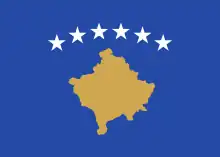 Republic of Kosovo is recognized as an independent and sovereign country by 98 UN member states, including the U.S., 23 out of 28 EU members, etc. The International Court of Justice found that Kosovo's declaration of independence did not violate international law.[1]
Republic of Kosovo is recognized as an independent and sovereign country by 98 UN member states, including the U.S., 23 out of 28 EU members, etc. The International Court of Justice found that Kosovo's declaration of independence did not violate international law.[1]
Historic unrecognized or partially recognized states with de facto control over their territory
Europe
- Banat Republic (proclaimed in 1918). Now part of Romania, Serbia, and Hungary.
- Baranya-Baja Republic (proclaimed in 1921). Now part of Hungary and Croatia.
- Carpatho-Ukraine (1939). Now part of Ukraine.
 Chechnya (1996-1999). Now controlled by Russian forces. See also Chechen Republic of Ichkeria.
Chechnya (1996-1999). Now controlled by Russian forces. See also Chechen Republic of Ichkeria..svg.png.webp) Independent State of Croatia (1941-1945). Between 1945 and 1991, Croatia was a people's/socialist republic within Yugoslavia. Since 1991, Croatia is an independent country. Recognized since 1992.
Independent State of Croatia (1941-1945). Between 1945 and 1991, Croatia was a people's/socialist republic within Yugoslavia. Since 1991, Croatia is an independent country. Recognized since 1992. Irish Republic (1919-1922). Now it is divided into the Republic of Ireland and Northern Ireland.
Irish Republic (1919-1922). Now it is divided into the Republic of Ireland and Northern Ireland. Finnish Socialist Workers Republic (1918)
Finnish Socialist Workers Republic (1918)- Free Derry (August 14 1969 to July 31 1972) Now it is part of Northern Ireland.
 Gagauzia (1990-1994). Now part of Moldova.
Gagauzia (1990-1994). Now part of Moldova. Croatian Republic of Herzeg-Bosnia (1992-1994). Now part of Bosnia and Herzegovina.
Croatian Republic of Herzeg-Bosnia (1992-1994). Now part of Bosnia and Herzegovina. Lajtabansag State (1921). Now part of Austria.
Lajtabansag State (1921). Now part of Austria. Limerick Soviet (1919). Now part of Republic of Ireland.
Limerick Soviet (1919). Now part of Republic of Ireland.- Montenegro (1941-1944). Formerly in union with Republic of Serbia in Serbia and Montenegro.
- Serbia (1941-1944). Formerly in union with Republic of Montenegro in Serbia and Montenegro.
 Republic of Serbian Frontier (1991-1995). Now part of Croatia.
Republic of Serbian Frontier (1991-1995). Now part of Croatia. Slovakia (1939-1945). Between 1945 and 1993, Slovakia was part of Czechoslovakia. Since 1993, Slovakia is an independent country.
Slovakia (1939-1945). Between 1945 and 1993, Slovakia was part of Czechoslovakia. Since 1993, Slovakia is an independent country. Serbian Republic of Bosnia and Herzegovina (1992-1995). Now one of the two entities of Bosnia and Herzegovina.
Serbian Republic of Bosnia and Herzegovina (1992-1995). Now one of the two entities of Bosnia and Herzegovina. State of Slovenes, Croats and Serbs (1918). Now part of Slovenia, Croatia, Bosnia and Herzegovina and Serbia and Montenegro.
State of Slovenes, Croats and Serbs (1918). Now part of Slovenia, Croatia, Bosnia and Herzegovina and Serbia and Montenegro.- Republic of Užice (1941). Now part of Serbia and Montenegro.
- Republic of West Bosnia (1993-1995). Now part of Bosnia and Herzegovina.
- Sealand
Asia
 Kachin State is the northernmost state of Myanmar, controlled since 1962 by the Kachin Independence Organization but not diplomatically recognized by any country. In 1994, KIO and the Union of Myanmar agreed to formalize the status quo by creating the "Kachin State Special Region 1", officially still a part of the Union of Myanmar but de facto controlled by KIO.
Kachin State is the northernmost state of Myanmar, controlled since 1962 by the Kachin Independence Organization but not diplomatically recognized by any country. In 1994, KIO and the Union of Myanmar agreed to formalize the status quo by creating the "Kachin State Special Region 1", officially still a part of the Union of Myanmar but de facto controlled by KIO. Wa State is a de facto autonomous state within the Union of Burma. The Burmese government cannot control the region since independence. The ruling party calls itself "Wa State People's Government'. The Burmese government recognizes this state as part of the Shan State and officially uses "Wa Autonomous Division" and sometimes "Shan State Special Region 2".
Wa State is a de facto autonomous state within the Union of Burma. The Burmese government cannot control the region since independence. The ruling party calls itself "Wa State People's Government'. The Burmese government recognizes this state as part of the Shan State and officially uses "Wa Autonomous Division" and sometimes "Shan State Special Region 2". Kurdish Autonomous Region (1991-2003). A de facto independent state in Northern Iraq. Now part of the Kurdish autonomous region.
Kurdish Autonomous Region (1991-2003). A de facto independent state in Northern Iraq. Now part of the Kurdish autonomous region. Manchukuo (1932-1945). Out of 80 then existing nations 23 recognized the new state. Now part of the People's Republic of China.
Manchukuo (1932-1945). Out of 80 then existing nations 23 recognized the new state. Now part of the People's Republic of China. Tatarstan (1990 -1994). Now part of Russia
Tatarstan (1990 -1994). Now part of Russia Tuva (1921-1944). Now part of Russia
Tuva (1921-1944). Now part of Russia- Nakhichevan (1990). Now part of Azerbaijan.
- Talysh-Mugan Republic (proclaimed in 1993). Now part of Azerbaijan.
- Tamil Eelam (1983-2009). A part of Sri Lanka. For about 20 years the Liberation Tigers of Tamil Eelam maintained a de facto state in the North and East of Sri Lanka until their defeat in 2009.
 Artsakh (Nagorno-Karabakh) did declare independence from Azerbaijan in 1991, and was more or less functioning as a de facto state, until its defeat by Azerbaijan in 2020, and it came to an end when Azerbaijan occupied all of the remaining territory of Nagorno-Karabakh in 2023.
Artsakh (Nagorno-Karabakh) did declare independence from Azerbaijan in 1991, and was more or less functioning as a de facto state, until its defeat by Azerbaijan in 2020, and it came to an end when Azerbaijan occupied all of the remaining territory of Nagorno-Karabakh in 2023.
Africa
- Anjouan (1997-2002). Now part of Comoros.
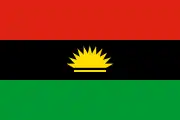 Biafra controlled territory in eastern Nigeria between the time of its secession in May 1967 until its final military collapse in January 1970. It was recognized by 12 nations.
Biafra controlled territory in eastern Nigeria between the time of its secession in May 1967 until its final military collapse in January 1970. It was recognized by 12 nations.- Katanga controlled the state of the same name within the former Belgian Congo after decolonisation, between 1960 and 1964.
 Mohéli (1997-1998). Now part of Comoros.
Mohéli (1997-1998). Now part of Comoros.- Rhodesia. British Colony that unilaterally declared independence in 1965. This action was not legally recognized by any other nation, nor the declaration of Rhodesia as a republic in 1970. This entity remained until 1979, when it became Zimbabwe-Rhodesia.
- Zimbabwe-Rhodesia. Formed in 1979 after negotiations between white minority government and moderate black leaders. Existed 1 June to 12 December 1979, when it became the colony of South Rhodesia again. In 1980 it became the Republic of Zimbabwe.
South African Homelands
Created by the Republic of South Africa from its own territory
- Bophuthatswana (1977-1994). Former Thuisland formed and only recognized by South Africa, Transkei, Ciskei, and Venda. Now part of South Africa.
- Ciskei (1981-1994). Former Thuisland formed and only recognized by South Africa, Bophuthatswana, Transkei, and Venda. Now part of South Africa.
- Transkei (1976-1994). Former Thuisland formed and only recognized by South Africa, Bophuthatswana, Ciskei, and Venda. Now part of South Africa.
.svg.png.webp) Venda (1979-1994). Former Thuisland formed and only recognized by South Africa, Bophuthatswana, Ciskei, and Transkei. Now part of South Africa.
Venda (1979-1994). Former Thuisland formed and only recognized by South Africa, Bophuthatswana, Ciskei, and Transkei. Now part of South Africa.
Americas
- Independent State of Acre (1899-1903). Now part of Brazil.
- California Republic (1846-1848). Now part of the United States of America.
- Confederate States of America (1861-1865). Originally formed on February 4, 1861 by seven Southern slave states (South Carolina, Mississippi, Florida, Alabama, Georgia, Texas, and Louisiana) after confirmation of the election of Abraham Lincoln as President of the United States. Jefferson Davis was selected as its first President the next day. After the American Civil War began, the states of Virginia, Tennessee, Arkansas, and North Carolina joined. Recognized diplomatically only by Saxe-Coburg and Gotha, though recognized by some nations as a "belligerent power". Now part of the United States of America.
- Republic of Hawaii (1894-1898). Now part of the United States of America.
- Republic of Texas (1836-1845). Five nations recognized this entity. Now part of the United States of America.
- Vermont Republic (1771-1791). Now part of the United States of America.
- Piratini Republic (1836-1845). Today's Rio Grande do Sul, part of Brazil.
- Republic of the Rio Grande 1840. Now part of the United States.
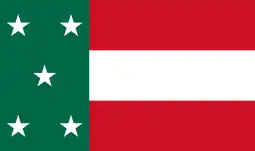 Republic of the Yucatán 1841-1843. Short-lived separatist state; reintegrated into Mexico.
Republic of the Yucatán 1841-1843. Short-lived separatist state; reintegrated into Mexico.- Republic of Canada (1837-1838). Now part of Canada.
Oceania
- Bougainville (Republic of North Solomons) (1990-1997). Signed a peace deal with Papua New Guinea giving the island autonomy pending an independence referendum within a decade.
.svg.png.webp) Rotuma (1987-1988). This Polynesian-inhabited island which is administered by (Melanesian) Fiji declared its independence from Fiji by separatists after the military coups in Fiji in 1987.
Rotuma (1987-1988). This Polynesian-inhabited island which is administered by (Melanesian) Fiji declared its independence from Fiji by separatists after the military coups in Fiji in 1987.- (Kanaky). The Nouméa Accords of 1998 postponed a referendum on independence until after 2014.
Historic unrecognized or partially recognized governments with de facto control over their territory
These regimes had control over the territory of a country for which most other states recognized a different government as being the legitimate government:
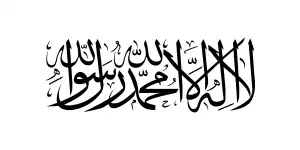 Islamic Emirate of Afghanistan (1996-2001). Only three states recognized this entity while the Taliban controlled it. See: History of Afghanistan.
Islamic Emirate of Afghanistan (1996-2001). Only three states recognized this entity while the Taliban controlled it. See: History of Afghanistan. People's Republic of Kampuchea (1979-1989). Set up by the Vietnamese after their invasion and rout of the Khmer Rouge in Cambodia. Only a few Soviet-Bloc nations recognized this entity, while the UN, China, and most other nations recognized the Khmer Rouge's Democratic Kampuchea government. Succeeded by the State of Cambodia, then the Kingdom of Cambodia.
People's Republic of Kampuchea (1979-1989). Set up by the Vietnamese after their invasion and rout of the Khmer Rouge in Cambodia. Only a few Soviet-Bloc nations recognized this entity, while the UN, China, and most other nations recognized the Khmer Rouge's Democratic Kampuchea government. Succeeded by the State of Cambodia, then the Kingdom of Cambodia.
Related pages
References
- "World court says Kosovo's independence is legal - Yahoo! News". News.yahoo.com. Retrieved 2010-07-24.